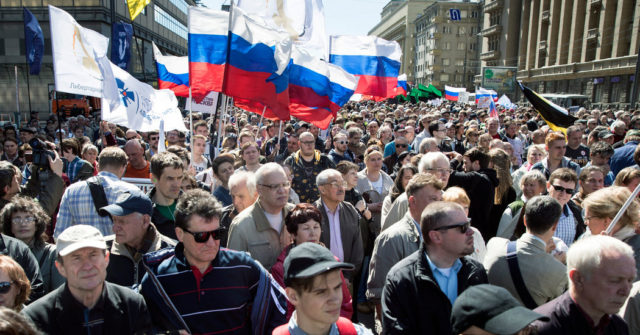
Liberals and Extreme Nationalists Unite Once More in Russia
Publication: Eurasia Daily Monitor Volume: 14 Issue: 64
By:

May 6 saw a protest on Moscow’s Sakharov Prospekt under the banner “against political repression.” The march was unremarkable except for the fact that it indicated the apparent decisive reuniting of the liberal and extreme nationalist components of the opposition to Russian President Vladimir Putin. The nationalists, long since depressed by the harassment of the authorities and their failure to develop a competent movement, were represented by the leaders Yuriy Gorski, Roman Kovalev, Dmitrii Stepanov, Valentin Alekseev and Dennis Romanov-Russkii (not his real name). These individuals were all followers of the far-right Dmitry Demushkin and carried a banner reading “freedom to Dmitry Demushkin,” a reference to his house arrest on the grounds of posting xenophobic pictures on social media. In addition, they shouted “freedom to [Aleksander] Belov,” another xenophobic far-right leader, who was imprisoned by the authorities on charges of embezzlement. Even more unusual: among the marchers were the blogger Vyacheslav Maltsev (number two on the PARNAS party list) and even the liberal Jewish civil activist Mark Galperin (Sova-center.ru, May 10). That a Jew was marching in support of those who have been accused in the past of anti-Semitism underscores the strange bedfellows that politics creates.
Cooperation between liberals and nationalist groups in Russia began with the 2011–2012 protests against fraudulent elections and Putin’s return to the presidency. Yet, cooperation quickly broke down. The nationalist alliance “Russkii” itself split over the issue of whether to support the “Novorossiya” (“New Russia”) project (whose aim was to wrest southeastern Ukrainian territory from Kyiv’s control) or to welcome the Maidan revolution in Ukraine as a model to be carried to Moscow. The remaining Demushkin-Belov supporters saw potential backers in the liberal opposition. However, relations between far-right nationalists and the liberals were strained until May 29, 2016, when Maltsev—a blogger from Saratov who presents the show “Plokhie Novosti” (“Bad News”) on the YouTube channel Artpodgotovka (Art Preparation)—won the online primaries for PARNAS. Once the September 2016 Duma elections were over, which Maltsev ended up losing, some members of his electoral team (including the liberal Galperin) and Demushkin’s followers Gurtsy and Beletsky began jointly organizing “Walks of the Opposition” (“Progulkii Oppositzi”) demonstrations and called on other angry citizens to join them. The walks are carried out in a passive-aggressive manner, where people simply gather and walk without banners, slogans or chants, on account of the fact that the government has banned many protests—even when its participants applied for permits (Sova-center.ru, March 22). Thus, cooperation and civil disobedience continue in Russia, even under conditions of legal repression.
This goes some way toward explaining the coordination of street protests that occurred on March 26, 2017, which were supposedly organized solely online. The protests took nearly all observers by surprise and emerged seemingly in response to the publication of an online video outlining the extent of Prime Minister Dmitry Medvedev’s corruption (see EDM, March 27). The action on May 6 serves to underline the deeper organizational structure of the protest movement, as well as its potential for further activities. Indeed, as if to underscore this point, opposition leader and anti-corruption blogger Alexei Navalny has called for new protests in Russia on June 12, Russia Day. Navalny wrote, “Let us go into the streets, on June 12, with our old slogans and state flags. We have two months to prepare. We will attract even more cities, we will gather even more people.” The head of the Moscow Department of Regional Security and Anti-Corruption declined to say whether permission for the rally had been granted, claiming that she did not yet have this information (RBC, April 12).
The identities of some of the above-cited opposition activists are interesting, particularly within the context of Russia’s contentious politics. Some of these personalities may represent people to watch for, going forward. First, the Jewish liberal activist Mark Galperin was born on April 20 (ironically, Adolf Hitler’s birthday), 1968, in an outlying city of Moscow Oblast. After serving in the army between 1986 and 1988, he went on to a career in marketing and telecommunications. Galperin joined the anti-Putin opposition in 2011, formally with the Russian organization “Solidarity” and the political party PARNAS. Over the past three years, Galperin has organized or participated in dozens of sanctioned and unsanctioned political protests and is currently involved in attempts to foment a democratic revolution. At the time of the protests in 2011, he was holding weekly pickets on central Moscow’s Manezhnaya Square, in an attempt to regularize this practice, as well as conducting agitprop on the internet (7×7-journal.ru, April 2011). Second, the blogger Vyacheslav Maltsev was born in 1964, in the city of Saratov. He served in the Komsomol, the Soviet army, and went into employment with the Communist Party. Elected in 1994 to the Saratov regional Duma, he worked there until 2007, after being voted out of office. He tried running again for the same seat in 2012, under the banner of the Communist Party of the Russian Federation, but was unsuccessful. Since 2013, he has turned to online blogging and video production, including the show “Bad News” which counts down the days until the new regime (apparently due to start on November 5, 2017). A fan of conspiracy theories, Maltsev has railed against the “Jewish mafia in medicine” and the “Masonic plot” (Meduza.io, August 26, 2016). Russian opposition politics makes for strange bedfellows indeed.



